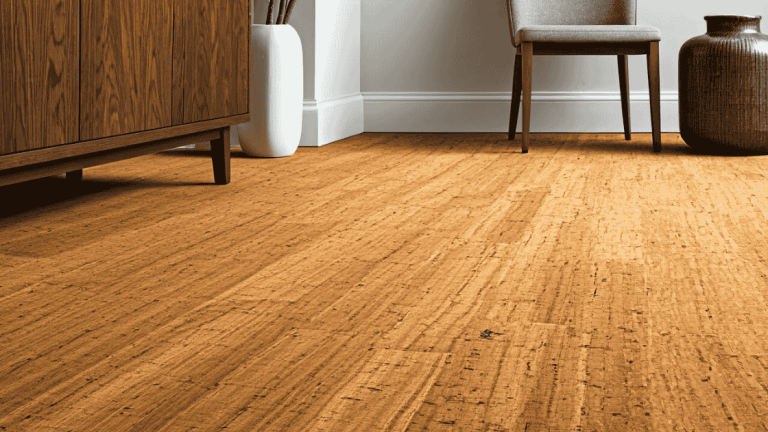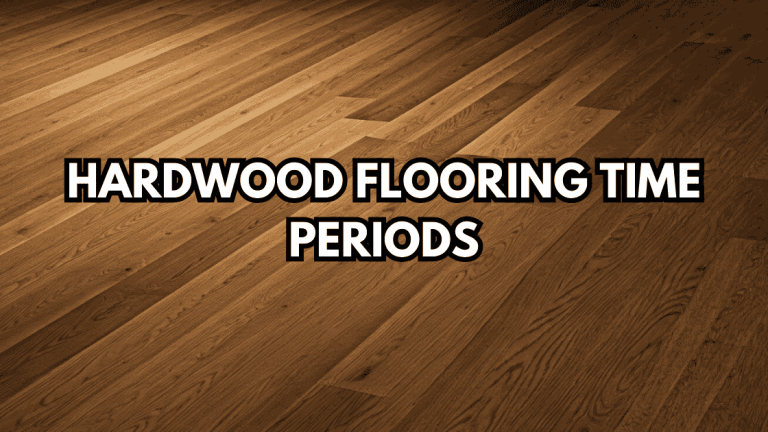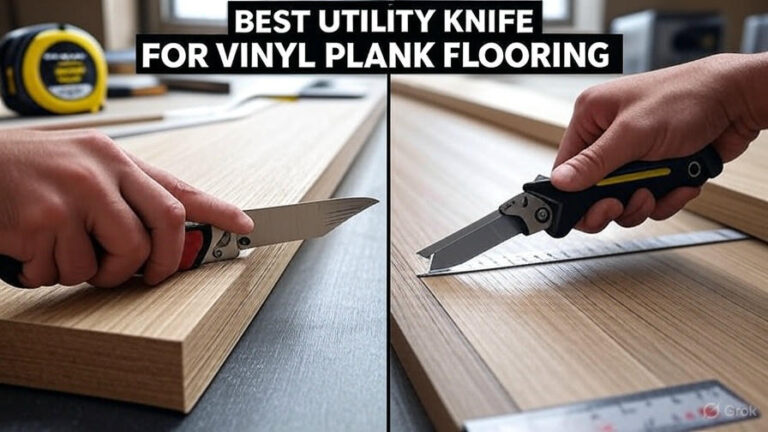What Is Vinyl Flooring Made Of? (Details About Vinyl Flooring)
Whether you are seeing or thinking about vinyl flooring, you might be thinking about what is vinyl flooring made of. The simple answer is:
Vinyl flooring is predominantly made from polyvinyl chloride (PVC) resin. It often includes multiple layers, such as a core, design, and wear layer.
What Is Vinyl Flooring Made Of [ In Depth]
Vinyl flooring is primarily composed of synthetic materials, chiefly polyvinyl chloride (PVC), which is processed to produce a versatile and durable floor covering. Multiple layers, including a core, decorative pattern, and protective wear layer, contribute to its resilience and aesthetic appeal.
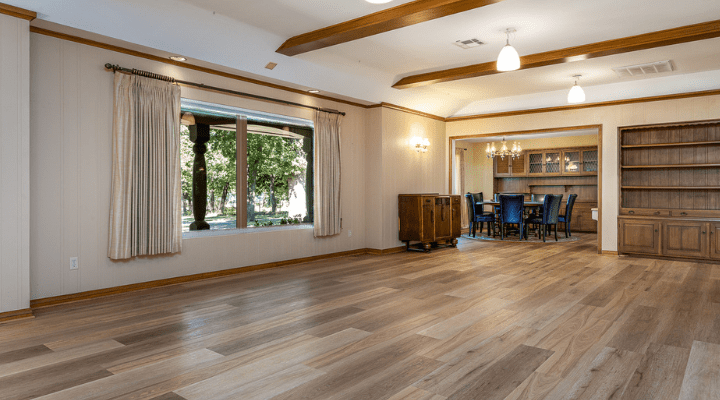
Vinyl flooring has become a popular choice for homeowners and businesses due to its durability, versatility, and affordability. But what goes into making this resilient flooring material? Let’s peel back the layers and discover the components that compose vinyl flooring:
1. Core Material Layer:
- The core layer provides structural stability and support to the flooring.
- It is often made of PVC (polyvinyl chloride) or a composite of PVC and limestone for added strength.
- The thickness of the core layer can vary, influencing the overall durability of the flooring.
2. Protective Layer (or Printed/Decorative Layer):
- This layer is located above the core layer.
- The protective layer is usually made of a clear PVC film, but it can also include additives and enhancements for specific properties. These additives may include urethane for added durability, resistance to stains, and ease of maintenance.
- It often contains a high-resolution image or pattern that gives the flooring its visual appearance.
- The protective layer can enhance the realism of the design and provide additional protection to the core.
3. Wear Layer:
- The wear layer is the topmost layer of the vinyl flooring.
- The wear layer is usually made of clear PVC and may include additives for enhanced performance.
- It is designed to resist scratches, stains, and fading, providing durability and longevity to the floor.
Types Of Vinyl Flooring
Vinyl flooring is crafted primarily from synthetic materials, notably PVC resins, which are combined with plasticizers for flexibility and textural finish materials for design variety. Within the vinyl category, one can find sheet vinyl, luxury vinyl tiles (LVT), and vinyl composite tiles (VCT), each with distinct compositions and aesthetic appeal.
It has surged in popularity, and it’s easy to see why as it’s durable, affordable, and versatile. One might wonder what makes vinyl flooring such a widely chosen material. Well, it’s all in its makeup and the various types available to suit different aesthetics and functional needs.
There are many types of Vinyl Flooring. But these are commonly used widely:
- Sheet Vinyl Flooring
- Luxury Vinyl Plank (LVP)
- Luxury Vinyl Tile (LVT)
- Vinyl Composite Tile (VCT)
- Waterproof Vinyl Flooring
Sheet Vinyl Flooring
Sheet vinyl flooring is revered for its seamless installation and ability to repel moisture effectively. This type of vinyl flooring comes in large, flexible sheets that can be laid down quickly, covering vast areas without the need for multiple seams.
Sheet vinyl is particularly well-suited for spaces like kitchens and bathrooms where water resistance is crucial.
Luxury Vinyl Plank (LVP)
Think of luxury vinyl plank (LVP) as the chameleon of vinyl flooring; it mimics the look of natural wood so closely, that you might be fooled at first glance. But it’s not just about looks:
- Realistic textures: LVP is embossed with grain patterns to give an authentic wood feel.
- Durability: It stands up to heavy foot traffic and resists scratches and stains.
- Easy installation: Many LVP options come with a click-lock system, making DIY projects a breeze.
LVP is an excellent choice for those who covet the hardwood aesthetic but require the resilience and maintenance ease of vinyl.
Luxury Vinyl Tile (LVT)
Bringing the essence of stone or ceramic tiles without the chill underfoot, luxury vinyl tile (LVT) is a warm, inviting option for many homeowners. Here’s why LVT might be the right pick:
- Style diversity: With a plethora of design options, LVT fits any interior decor scheme.
- Comfort: It’s softer and warmer to the touch compared to natural tile.
- Sound dampening: LVT tends to absorb sound, contributing to a quieter space.
Whether it’s mimicking marble or slate, luxury vinyl tile offers a practical yet sophisticated flooring solution.
Vinyl Composite Tile (VCT)
Designed to endure the hustle and bustle of high-traffic commercial spaces, vinyl composite tile (VCT) is a robust choice that combines vinyl with a mix of limestone and other materials. It’s a go-to for businesses due to:
- Endurance: VCT holds up against constant wear and tear.
- Design versatility: An assortment of colors and patterns are available for unique layout designs.
- Economical: This is a cost-effective solution for large-scale flooring needs.
However, VCT does require regular polishing and maintenance to keep it looking its best, making it a practical yet hands-on flooring option.
Waterproof Vinyl Flooring
Today’s homes call for practicality and waterproof vinyl flooring answers that call with gusto. This flooring type ensures that spills and moisture won’t cause any damage, boasting:
- Complete moisture resistance: Ideal for rooms exposed to water spills.
- Long-lasting: Waterproof vinyl is built to survive in demanding environments.
- Various designs: It comes in patterns and styles suited to every taste.
For households with pets, kids, or a penchant for hosting, waterproof vinyl flooring offers peace of mind and enduring style.
Vinyl Flooring Advantages And Disadvantages
As for its advantages, vinyl stands out for its cost-effectiveness and versatility, while on the flip side, it can be susceptible to gouges and does not biodegrade.
Vinyl flooring, a popular choice across homes and businesses, owes its reputation to a plethora of benefits. Its diverse advantages make it a versatile option for various settings. Let’s see the key strengths of vinyl flooring:
| Advantages | Disadvantages |
|---|---|
| 1. Affordability: Vinyl flooring is often more budget-friendly compared to other flooring options. | 1. VOC Emissions: Some vinyl flooring may release volatile organic compounds (VOCs), which can affect indoor air quality. |
| 2. Variety of Designs: It comes in a wide range of styles, colors, and patterns, mimicking the look of natural materials. | 2. Durability: While durable, vinyl may not be as resistant to heavy impacts or sharp objects as some other flooring options. |
| 3. Water Resistance: Vinyl is resistant to water, making it suitable for bathrooms and kitchens. | 3. Not Biodegradable: Vinyl is a synthetic material and is not biodegradable, posing environmental concerns. |
| 4. Easy Maintenance: It’s easy to clean and maintain, usually requiring simple sweeping and occasional mopping. | 4. Not as Eco-Friendly: Production and disposal of vinyl may have environmental implications. |
| 5. Comfortable Underfoot: It tends to be softer and warmer underfoot compared to materials like tile. | 5. Not as Authentic: While it can mimic the look of natural materials, it may not have the same authenticity. |
| 6. Installation Options: Vinyl flooring comes in sheets, tiles, and planks, providing various installation methods. | 6. Not Ideal for Resale: Some homeowners prefer natural materials, so vinyl might not add as much resale value. |
Remember that the suitability of vinyl flooring depends on factors such as the specific type of vinyl, the location of installation, and individual preferences.
Is Vinyl Flooring Waterproof?
Vinyl flooring is renowned for its durability and resistance to moisture. Composed primarily of synthetic polymers, it stands as an excellent waterproof option for areas prone to spills and humidity.
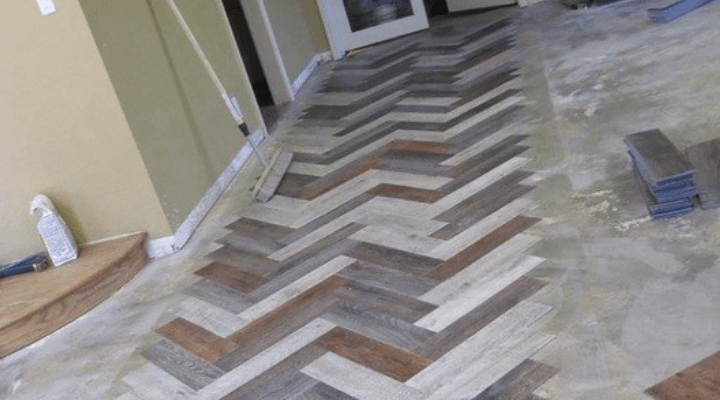
How Long Do Vinyl Floors Last?
Vinyl flooring, crafted from synthetic materials like PVC, offers a blend of durability and style. With proper care, vinyl floors can last between 10 to 20 years, seamlessly integrating longevity with the aesthetic appeal of their composite makeup.
Vinyl flooring’s longevity is one of its standout features. Typically, well-maintained vinyl flooring can last anywhere from 10 to 20 years, but this can stretch even longer with higher-quality materials and careful usage. The durability largely depends on the wear layer’s thickness and the flooring’s overall quality.
Some Factors That Affect The Lifespan of Vinyl Flooring:
- Quality of Material: High-quality vinyl will resist wear and tear much better, directly influencing its service life.
- Thickness of Wear Layer: The thicker this layer, the more protection your vinyl flooring has against scratches and scuffs, prolonging its appearance and functionality.
- Level of Foot Traffic: In high-traffic areas, the flooring will endure more stress, shortening its lifespan compared to those in less frequented spaces.
- Maintenance Routine: Regular cleaning and proper care can significantly extend the life of your vinyl floors.
It is worth noting that advancements in manufacturing have extended the durability and resiliency of vinyl floors, making it a sound investment for both residential and commercial settings. Yet, regular cleaning and the occasional use of protective pads under furniture can make a substantial difference in their longevity.
Some Factors That Affect Vinyl Flooring Durability:
Understanding what influences the life expectancy of your vinyl flooring can help you make informed decisions about its care. Here’s a closer look:
- Sunlight Exposure: Continuous exposure to sunlight can cause discoloration and degradation over time, impacting the flooring’s look and lifespan.
- Quality of Installation: A properly installed floor will not only last longer but also provide a better overall appearance and performance.
- Temperature Fluctuations: Vinyl floors can be sensitive to extreme temperature changes, potentially affecting their durability if not acclimatized correctly.
Considering these factors can guide your selection and maintenance strategy to enhance the lasting appeal of your floors. Opting for vinyl floors means investing in a solution that can stand the test of time with the right care and conditions, embodying both style and endurance.
Environmental And Health Considerations of Vinyl Flooring
It’s essential to be aware of the environmental and health impacts of the materials we bring into our spaces. For vinyl flooring, here’s what to consider:
- VOC Emissions: Volatile organic compounds (VOCs) can be released from vinyl flooring, affecting indoor air quality. However, many manufacturers now offer low-VOC or VOC-free options.
- Recyclability: As sustainability becomes more critical, the recyclability of vinyl flooring materials is of notable concern. Some types of vinyl flooring are recyclable, depending on their composition and local recycling facilities.
Vinyl flooring is a complex assembly of layers and materials, each contributing to its functional properties. Its ease of maintenance, diverse design options, and moisture resistance make it attractive for various applications.
Knowing what vinyl flooring is made of can help you make an informed decision that aligns with your requirements for performance, design, and environmental impact.
Some Resources For Vinyl Flooring
Websites that guide you for making Vinyl Flooring:
1. The Spruce:
- Offers a comprehensive guide to vinyl flooring, including information on different types, installation, and maintenance.
- Provides insightful articles on specific topics like best vinyl flooring for pets, waterproof vinyl flooring options, and vinyl flooring trends.
- Features real-life examples of vinyl flooring in various settings.
- Website: https://www.thespruce.com/vinyl-flooring-4127823
2. Flooring Inc.:
- Provides detailed information on different vinyl flooring types, including luxury vinyl tile (LVT), vinyl plank flooring (VLP), and sheet vinyl.
- Offers resources on choosing the right vinyl flooring for your needs, including a product comparison tool.
- Features a helpful installation guide and maintenance tips.
- Website: https://www.flooringinc.com/vinyl/planks/index.html
3. Floor & Decor:
- Offers a wide selection of vinyl flooring products from various brands.
- Provides a visualizer tool to help you see how different vinyl flooring options would look in your home.
- Features informative blog articles on trends, installation tips, and product comparisons.
- Website: https://www.flooranddecor.com/
4. Shaw Floors:
- A leading manufacturer of vinyl flooring, offering a wide range of high-quality products.
- Provides detailed information on each product, including specifications, warranty information, and installation instructions.
- Features a helpful design tool to help you create the perfect flooring look for your home.
- Website: https://shawfloors.com/
5. Armstrong Flooring:
- Another leading manufacturer of vinyl flooring, offering a variety of styles and colors.
- Provides a product finder tool to help you choose the right vinyl flooring for your needs.
- Features a virtual room designer tool to help you see how different flooring options would look in your home.
- Website: https://www.armstrongflooring.com/en-us
PDF Resources in Vinyl Flooring:
1. Vinyl Flooring Installation Guide:
- This guide from the National Wood Flooring Association provides detailed information on installing vinyl flooring, including preparation, layout, and cutting.
- Download: https://nwfa.org/technical-guidelines/
2. Vinyl Flooring Maintenance Guide:
- This guide from the Resilient Floor Covering Institute provides tips on cleaning and caring for your vinyl flooring.
- Download: https://rfci.com/
3. Vinyl Flooring Product Comparison Guide:
- This guide from Floor & Decor compares different vinyl flooring products based on features, price, and warranty.
- Download: https://www.flooringinc.com/vinyl/planks/index.html
Vinyl Flooring Video Resources:
1. How to Install Vinyl Plank Flooring:
- This video from The Home Depot provides a step-by-step guide to installing vinyl plank flooring.
- Watch: https://www.youtube.com/watch?v=dT32P6RS2eI
2. How to Choose the Right Vinyl Flooring:
- This video from This Old House provides tips on choosing the right vinyl flooring for your needs.
- Watch: https://m.youtube.com/watch?v=WqyKhSYkpRQ
3. Vinyl Flooring Installation Mistakes to Avoid:
- This video from Floor & Decor highlights common vinyl flooring installation mistakes and how to avoid them.
- Watch: https://www.youtube.com/watch?v=eT0RYK5fkdk
4. Vinyl Flooring Trends for 2023:
- This video from Shaw Floors showcases the latest trends in vinyl flooring design.
- Watch: https://www.youtube.com/channel/UCTNrgMbplHEt1OS7GeLwMYA
5. How to Clean and Maintain Vinyl Flooring:
- This video from Armstrong Flooring provides tips on cleaning and maintaining your vinyl flooring.
- Watch: https://www.youtube.com/watch?v=acMRlzTbCbo
By diving into these resources, you can equip yourself with the knowledge needed to choose the perfect vinyl flooring for your space. Whether you’re remodeling or selecting flooring for a new home, understanding the makeup and options available in vinyl flooring can lead to a more satisfying purchase.
Lastly, Is Vinyl Flooring Good For Me?
Making the final decision on whether vinyl flooring suits your needs encompasses weighing the pros and cons. Its budget-friendliness, ease of maintenance, and variety are its strongest selling points. Yet, taking into account matters of health and environmental impact is equally paramount.
For those seeking a balance between affordability, style, and straightforward care, vinyl flooring shines. It’s particularly conducive to spaces that experience a lot of foot traffic or where spills are likely. If you value plush walking comfort and a wide range of design options, this could be your go-to flooring solution.
On the flip side, if indoor air quality and ecological sustainability top your list of priorities, delving deeper into the specific type of vinyl flooring—such as looking for low-VOC or recyclable options—is crucial. Your ultimate choice should align with your personal values, lifestyle demands, and long-term home or business objectives.
Vinyl flooring offers the adaptability to meet various needs, making it a robust contender in the flooring market.
Queries on Minds:
What Are The Disadvantages Of Vinyl Flooring?
Vinyl flooring can emit volatile organic compounds (VOCs), posing health concerns. Susceptibility to scratches and scuffs may affect durability. Prolonged exposure to sunlight can cause fading. It’s also not as eco-friendly due to difficulty in recycling.
What Are The Ingredients In Vinyl Flooring?
Vinyl flooring typically consists of polyvinyl chloride (PVC) resin, plasticizers, pigments, stabilizers, and a backing material. Some types may also include calcium carbonate, felt, fiberglass, and various texture enhancers for improved durability and aesthetic appeal.
Is Vinyl A Wood Or Plastic?
Vinyl is a synthetic plastic, not a wood. It’s made from ethylene and chlorine, which together form Polyvinyl Chloride, or PVC.
Is Vinyl Flooring Better Than Laminate?
Vinyl flooring boasts superior water resistance compared to laminate, making it a better choice for damp areas. Laminate, however, tends to have a more realistic wood-look finish and may feel harder underfoot. Choose based on your room’s moisture exposure and aesthetic preferences.

